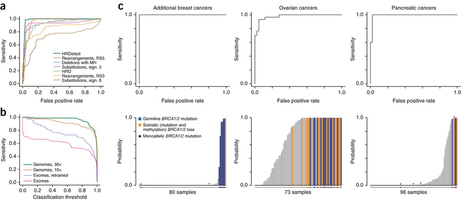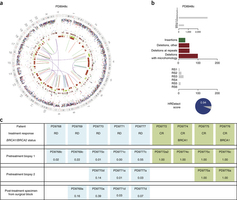30 september 2017: Lees ook dit artikel:
28 april 2017: Bron: Nature Medicine 23,517–525
"HRDefect is een voorspeller van BRCA1 en BRCA2-deficiëntie op basis van mutatie kenmerken" Met deze titel publiceren onderzoekers een onderzoek dat aantoont dat bij veel meer borstkankerpatiënten dan tot nu toe aangenomen een BRCA mutatie, of erfelijk of somatisch, als oorzaak kan worden gezien van hun borstkanker. Tot nu toe wordt ervan uitgegaan dat 1 tot 5 procent van de borstkankerpatiënten een BRCA mutatie hebben, maar dit laatste onderzoek stelt dat bij wel 20 procent deze BRCA mutaties of daarop gelijkende mutaties een rol spelen. Dit impliceert ook dat er voor deze groep van patiënten een behandelingsoptie bijkomt met zogeheten PARP remmers, ook wel antineoplaston medicijnen genoemd.
Bij eierstokkanker met BRCA mutaties werken deze medicijnen beter dan andere traditionelere medicijnen. Olaparib is er daar 1 van maar er zijn er meerdere. Of en waar en wanneer de HRDetect beschikbaar is voor patiënten durf ik niet te zeggen, maar wellicht kunt u dat aan uw behandelend arts vragen.
Lees bv. deze studies van op BRCA geteste patiënten met eierstokkanker (50 procent blijkt BRCA mutaties of daarop gelijkende mutaties te hebben) en de resultaten daarvan: PARP Inhibitors in Epithelial Ovarian Cancer: State of Art and Perspectives of Clinical Research
Hieronder enkele grafieken uit de nieuwe studie: HRDetect is a predictor of BRCA1 and BRCA2 deficiency based on mutational signatures welke tegen betaling is in te zien. Het abstract staat onder de grafieken.

En hier een HRDetect van 1 patient:

Hier het abstract van deze studie:
Ovarian Cancer Antineoplastic Agents May Be Useful in Breast Cancers With Rare BRCA Mutational Signatures
HRDetect is a predictor of BRCA1 and BRCA2 deficiency based on mutational signatures
- Nature Medicine
- 23,
- 517–525
- doi:10.1038/nm.4292
- Received
- Accepted
- Published online
-
Abstract
Approximately 1–5% of breast cancers are attributed to inherited mutations in BRCA1 or BRCA2 and are selectively sensitive to poly(ADP-ribose) polymerase (PARP) inhibitors. In other cancer types, germline and/or somatic mutations in BRCA1 and/or BRCA2 (BRCA1/BRCA2) also confer selective sensitivity to PARP inhibitors. Thus, assays to detect BRCA1/BRCA2-deficient tumors have been sought. Recently, somatic substitution, insertion/deletion and rearrangement patterns, or 'mutational signatures', were associated with BRCA1/BRCA2 dysfunction. Herein we used a lasso logistic regression model to identify six distinguishing mutational signatures predictive of BRCA1/BRCA2 deficiency. A weighted model called HRDetect was developed to accurately detect BRCA1/BRCA2-deficient samples. HRDetect identifies BRCA1/BRCA2-deficient tumors with 98.7% sensitivity (area under the curve (AUC) = 0.98). Application of this model in a cohort of 560 individuals with breast cancer, of whom 22 were known to carry a germline BRCA1 or BRCA2 mutation, allowed us to identify an additional 22 tumors with somatic loss of BRCA1 or BRCA2 and 47 tumors with functional BRCA1/BRCA2 deficiency where no mutation was detected. We validated HRDetect on independent cohorts of breast, ovarian and pancreatic cancers and demonstrated its efficacy in alternative sequencing strategies. Integrating all of the classes of mutational signatures thus reveals a larger proportion of individuals with breast cancer harboring BRCA1/BRCA2 deficiency (up to 22%) than hitherto appreciated (~1–5%) who could have selective therapeutic sensitivity to PARP inhibition.
Subject terms:
Gerelateerde artikelen
- Elacestrant geeft betere ziekteprogressievrije tijd bij uitgezaaide borstkanker (type ER plus / HER2 negatief en met ESR1 mutatie) na falen van CDK4/6 remmer plus hormoontherapie
- ctDNA, een bloedtest op circulerend DNA geeft 98 procent betrouwbaarheid bij borstkankerpatienten en bewijst effectiviteit van gebruik in de klinische praktijk bij studie met 350 patienten
- Sacituzumab govitecan (Trodelvy) een anti-lichaam medicijn geeft zeer goede resultaten bij borstkankerpatiënten met voorbehandelde uitgezaaide triple-negatieve borstkanker met TROP-2 mutatie in vergelijking met chemotherapie copy 1
- Borstkanker: BRIP1 mutatie geeft uitstekende respons op olaparib bij uitgezaaide HR-positieve, HER2-negatieve borstkanker blijkt uit casestudie copy 1
- CDK4 en 6-remmers - palbociclib, ribociclib en abemaciclib - zijn mogelijk minder effectief bij patiënten met mutaties in deze genen BRCA1/2-ATM-CHEK2 in vergelijking met wild types van genoemde genen
- Borstkanker: Receptorstatus van primaire tumor bij vrouwen met uitgezaaide borstkanker verschilt gemiddeld 31 procent (range 20 tot 65 procent bij HER2+ subtype) met die van de receptorstatus van de uitzaaiingstumor
- Durvalumab met Olaparib en Paclitaxel geeft 17 procent betere complete remissies in vergelijking met alleen chemo bij vrouwen met borstkanker stadium II / III hoog risico, maar ook bij HER2 positief en triple negatief
- Genetische testen uitvoeren bij alle vrouwen met borstkanker kan jaarlijks veel doden aan eierstokkanker en borstkanker voorkomen en is veel kosten effectiever vergeleken met genetisch testen op basis van klinische criteria of familiegeschiedenis
- Borstkanker: Vrouwen met hormoongevoelige borstkanker in leeftijd van de overgang - 45 tot 50 jaar - zijn meer gebaat bij eerst aromastase remmers ipv tamoxifen als de eierstokken nog aanwezig zijn
- HRDetect voorspelt voor 98 procent of BRCA mutaties oorzaak zijn van borstkanker en 20 procent zou daarmee gevoelig zijn voor antineoplaston medicijnen zoals olaparib
- Genezend medicijn - Parpremmer voor vormen van kanker met verstoorde BRCA - PD-functie ligt al jaren op de plank maar mag niet aan patienten worden gegeven
- Immuuntherapie met combinatiebehandeling van nivolumab en ipilimumab zou voor patienten met zogeheten metaplastische borstkanker een behandelingsoptie kunnen zijn blijkt uit kleinschalige studie copy 1
- Linda, diagnose borstkanker, ervaart dat ook haar kanker uniek is en zoekt samen met oncologe beste behandelingen via o.a. biomoleculair profile onderzoek bij Caris.
- Borstkanker wordt vaak overbehandeld. Erasmus MC doet daar wat aan via de Sonia studie.
- Borstkanker: bloedtest na behandeling van borstkanker waarbij resistentie optreedt traceert HER2 mutaties die soms ontstaan tijdens de behandeling met Kinaseremmers en hormoontherapie
- Borstkanker: Richtlijnen voor aanvullende behandelingen bij borstkanker, maar geldt ook voor andere vormen van kanker, officieel gepubliceerd in Amerika op basis van studiebewijs copy 2
- Borstkanker: Snel de beste medicijnen bij alle patiënten. Te beginnen met Olaparib.
- Borstkanker: PI3K remmer buparlisib naast fulvestrant geeft 30 tot 50 procent langere ziekteprogressievrije tijd maar wel meer bijwerkingen bij gevorderde borstkanker
- Borstkanker: Palpociclib plus fulvestrand geeft langere overall overleving en progressievrije ziekte dan alleen fulvesrtrand bij hormoonresistente borstkanker
- Borstkanker: DNA mutaties die een rol spelen bij ontstaan van borstkanker zijn verschillend bij Afrikaanse vrouwen dan bij Europees/Amerikaanse vrouwen blijkt uit grote case studie
- Borstkanker: Immuuntherapie in fase II studie voor patienten met triple negatieve borstkanker met nivolumab gestart in Anthonie van Leeuwenhoek ziekenhuis per 3 september 2015.
- Borstkanker: Voorspellende biomoleculaire markers en DNA mutaties bij borstkanker en uitgezaaide borstkanker: een overzichtstudie vanuit het Preagnant netwerk
- Borstkanker: 4-genentest voorspelt binnen 14 dagen wel of niet aanslaan van hormoonbehandeling met letrozole - femara
- Borstkanker: Enzalutamide - Xtandi geeft spectaculaire resultaten bij gevorderde triple negatieve borstkanker (stadium 4) met ook een positieve expressie van de hormoonreceptor.
- Borstkanker: CD8 positieve expressie plus T-cel infiltratie in tumor en beenmerg voorspellen als markers een significant verlaagd risico - 21 tot 57 procent - op overlijden aan borstkanker, zowel bij ER-HER2 pos als ER neg. vormen van borstkanker
- Borstkanker: PKI3CA enzym expressie bepalend voor verwacht resultaat van chemo behandeling bij borstkanker en is gerelateerd aan HER2 status en hormoonstatus copy 1
- Borstkanker: Pertuzumab - Perjeta door FDA goedgekeurd als eerstelijns behandeling immuuntherapie bij operabele borstkanker HER-2 positief na uitstekende resultaten uit fase 3 APHINITY studie copy 1








Plaats een reactie ...
Reageer op "HRDetect voorspelt voor 98 procent of BRCA mutaties oorzaak zijn van borstkanker en 20 procent zou daarmee gevoelig zijn voor antineoplaston medicijnen zoals olaparib"